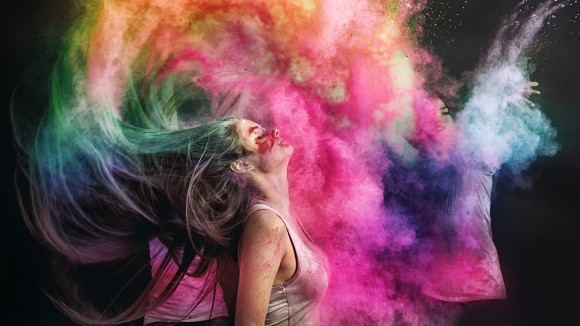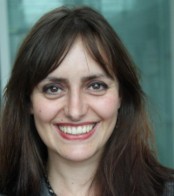 Beatriz Calvo-Merino is a Professor in Cognitive Neuroscience at City, University of London, UK. Her research aims to understand how sensorimotor processes shape perception. To this end, she studies how visual and motor expertise modulates neural, physiological and behavioural responses during action observation, emotion processing and aesthetic appreciation. Prof Calvo-Merino has been an Editorial Board Member for Scientific Reports since 2022.
Beatriz Calvo-Merino is a Professor in Cognitive Neuroscience at City, University of London, UK. Her research aims to understand how sensorimotor processes shape perception. To this end, she studies how visual and motor expertise modulates neural, physiological and behavioural responses during action observation, emotion processing and aesthetic appreciation. Prof Calvo-Merino has been an Editorial Board Member for Scientific Reports since 2022.
 Emily S. Cross is a Professor of Human Neuroscience and Social Robotics at the MARCS Institute at Western Sydney University and the University of Glasgow, where she directs the Social Brain in Action Lab. The defining theme of her research is how we learn about other agents and actions in our social world, and how this learning manifests in the human brain and behaviour. By drawing upon theory and methods from social cognition, cognitive neuroscience, empirical aesthetics and social robotics, her work has led to new insights concerning how we perceive and interact with other agents (both human and artificial), with particularly novel insights into the role of learning, expertise, prior experiences and expectations. Prof Cross has been an Editorial Board Member for Scientific Reports since 2022.
Emily S. Cross is a Professor of Human Neuroscience and Social Robotics at the MARCS Institute at Western Sydney University and the University of Glasgow, where she directs the Social Brain in Action Lab. The defining theme of her research is how we learn about other agents and actions in our social world, and how this learning manifests in the human brain and behaviour. By drawing upon theory and methods from social cognition, cognitive neuroscience, empirical aesthetics and social robotics, her work has led to new insights concerning how we perceive and interact with other agents (both human and artificial), with particularly novel insights into the role of learning, expertise, prior experiences and expectations. Prof Cross has been an Editorial Board Member for Scientific Reports since 2022.
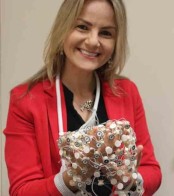 Caroline Di Bernardi Luft is a cognitive neuroscientist and an Associate Professor at Brunel University, UK. Her research combines advanced psychophysiological, neuroimaging and brain stimulation techniques to understand creativity and how it interacts with learning. She also uses hyperscanning techniques to understand how people’s brains synchronise when cooperating on creative tasks and how this affects creativity of individuals and groups. Dr Di Bernardi Luft has been an Editorial Board Member for Scientific Reports since 2018.
Caroline Di Bernardi Luft is a cognitive neuroscientist and an Associate Professor at Brunel University, UK. Her research combines advanced psychophysiological, neuroimaging and brain stimulation techniques to understand creativity and how it interacts with learning. She also uses hyperscanning techniques to understand how people’s brains synchronise when cooperating on creative tasks and how this affects creativity of individuals and groups. Dr Di Bernardi Luft has been an Editorial Board Member for Scientific Reports since 2018.
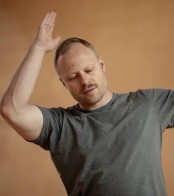 Guido Orgs is a Reader in Psychology at Goldsmiths, University of London, UK. He studied both performing dance (BA at the Folkwang University of the Arts, Essen, Germany) and Psychology (BSc/MSc at the University of Dusseldorf, Germany). He is Co-Director of the MSc in Psychology of the Arts, Neuroaesthetics and Creativity (with Dr Rebecca Chamberlain) and the Science of the Performing Arts (SPA) Lab (with Dr Jamie A. Ward) at Goldsmiths and Principal Investigator of the Neurolive project (www.neurolive.info). Dr Orgs has been an Editorial Board Member for Scientific Reports since 2022. Image credit: Camilla Greenwell
Guido Orgs is a Reader in Psychology at Goldsmiths, University of London, UK. He studied both performing dance (BA at the Folkwang University of the Arts, Essen, Germany) and Psychology (BSc/MSc at the University of Dusseldorf, Germany). He is Co-Director of the MSc in Psychology of the Arts, Neuroaesthetics and Creativity (with Dr Rebecca Chamberlain) and the Science of the Performing Arts (SPA) Lab (with Dr Jamie A. Ward) at Goldsmiths and Principal Investigator of the Neurolive project (www.neurolive.info). Dr Orgs has been an Editorial Board Member for Scientific Reports since 2022. Image credit: Camilla Greenwell
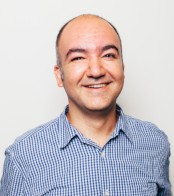 Oshin Vartanian is an Associate Professor in the Department of Psychology at the University of Toronto, Canada. He received his PhD in experimental psychology from the University of Maine. He is the Co-Editor of Psychology of Aesthetics, Creativity, and the Arts, and past Editor of Empirical Studies of the Arts. His main areas of interest include the cognitive and neural bases of aesthetics and creativity, and the impact of stress on health and performance. Dr Vartanian has been an Editorial Board Member for Scientific Reports since 2022.
Oshin Vartanian is an Associate Professor in the Department of Psychology at the University of Toronto, Canada. He received his PhD in experimental psychology from the University of Maine. He is the Co-Editor of Psychology of Aesthetics, Creativity, and the Arts, and past Editor of Empirical Studies of the Arts. His main areas of interest include the cognitive and neural bases of aesthetics and creativity, and the impact of stress on health and performance. Dr Vartanian has been an Editorial Board Member for Scientific Reports since 2022.
 Dhanraj Vishwanath is Senior Lecturer in Perception at the School of Psychology and Neuroscience at the University of St Andrews, UK. His research interests are primarily in 3D visual perception and the psychology of visual art and aesthetics. A focus of his work is on phenomenological and philosophical issues. He is currently working on a new theoretical account of the psychology of visual art and aesthetics. Dr Vishwanath has been an Editorial Board Member for Scientific Reports since 2021.
Dhanraj Vishwanath is Senior Lecturer in Perception at the School of Psychology and Neuroscience at the University of St Andrews, UK. His research interests are primarily in 3D visual perception and the psychology of visual art and aesthetics. A focus of his work is on phenomenological and philosophical issues. He is currently working on a new theoretical account of the psychology of visual art and aesthetics. Dr Vishwanath has been an Editorial Board Member for Scientific Reports since 2021.

